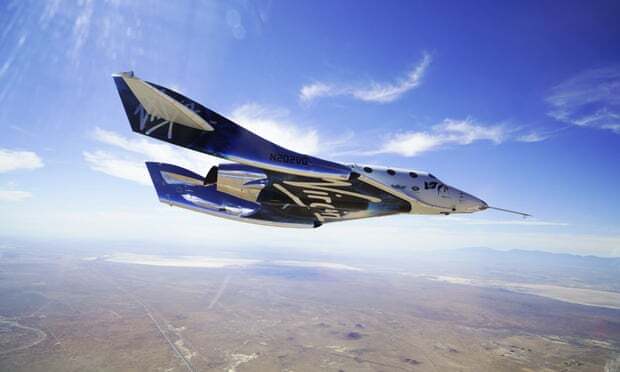16.01.2023
Investors are pursuing legal action against Virgin Galactic, claiming its carrier aircraft and space vehicle were not designed for regular space travel

n a desert basin in New Mexico, Richard Branson hopes history will be made later this year with the launch of Virgin Galactic’s first commercial flights to the edge of space, with tickets costing about $450,000 (£370,000) each.
It is an ambitious schedule to launch the “world’s first commercial spaceliner” at Spaceport America, even though it is already more than a decade late.
But getting to lift-off will be one of the greatest challenges of Branson’s career. The company already faces criticism over the safety and effectiveness of its operations in a number of lawsuits in the United States.
Branson initially hoped that he would send 50,000 astronauts into space by 2019, but the project has been beset by mishaps, delays and disaster. A pilot was killed and another suffered injuries when Virgin Galactic’s first SpaceShipTwo shuttle, VSS Enterprise, crashed in the Californian desert in October 2014.
The company’s active vehicles – the carrier aircraft VMS Eve and VSS Unity, the second SpaceShipTwo – have not flown since Branson’s trip to the edge of space in July 2021, while the share price has fallen from more than $55 at its peak to around $5.
Virgin Galactic was founded in 2004 and it was initially hoped that paying astronauts would be flying missions by 2007. The launch date of commercial services has been pushed back ever since. The company started trading on the New York Stock Exchange in October 2019. It said at the time that it anticipated launching its commercial service in 2020, to mark Branson’s 70th birthday.
Some investors are now pursing legal action against Virgin Galactic after the string of delays, claiming alleged defects in the craft were not properly disclosed. They allege Eve and Unity were prototypes and were not designed for regular space travel, and say their claims are supported by internal corporate documents.
In one of the cases filed in December 2021 by Mark Kusnier and other investors the complaint states: “Unity and Eve were so rickety that every flight could be their last. Cracks appeared on Eve’s wings after every flight, and some were not fixed – so much so that a Virgin Galactic employee said the wings looked like spiderwebs or cracked eggshells.”
Investors also claim that some technical failures or problems during flights were not properly disclosed, allowing Branson and others to sell shares at “artificially inflated” prices. Virgin Galactic has said it has always properly disclosed safety and design issues.
It is alleged in the case filed by Kusnier that one of the shuttle Unity’s horizontal stabilisers had “popped like a bag of potato chips” in a test flight in February 2019, and that on Branson’s flight to the edge of space in July 2021 the shuttle strayed outside its glide zone, putting the lives of the astronauts at risk.
Virgin Galactic had described Branson’s flight as “perfect”. However, A New Yorker article in September 2021 revealed that the shuttle had veered off course.
A US district-court judge in New York, Allyne Ross, found in November that some statements by Virgin Galactic concerning the flights in February 2019 and July 2021 were “materially misleading”, based on the claims set out by the plaintiffs.
The judge said: “I find that Branson did have motive and opportunity with respect to the statements regarding the success of his July 11, 2021 test flight… Branson sold over 10m shares of stock for total proceeds of nearly $300m in August 2021, just weeks before it was publicly revealed that Unity had strayed from its landing cone and risked a crash landing.”
Over the period covered in the Kusnier lawsuit, from July 2019 to October 2021, Branson sold shares in Virgin Galactic worth about $892m, according to court documents. Branson has said the share sales provided vital funds for the airline he founded, Virgin Atlantic.
The legal actions are being vigorously defended by Virgin Galactic, and Branson has said he is focused on delivering the commercial space service to customers who have booked tickets. About 900 people are already signed up.
Both Eve and Unity have undergone an “enhancement” programme to improve vehicle performance and “flight-rate capability”, Virgin Galactic says. The company aims to conduct test flights of Eve this month, and subsequently for Unity.
The first commercial passenger launch will carry an Italian air force crew for research, which will be followed by up to six paying passengers flying monthly. The company is also developing a new generation of spaceships called Delta class, which will be designed to fly weekly.
Virgin Galactic said last week that it would not comment on ongoing litigation, but confirmed its commercial service was on target to launch later this year.
Quelle: The Guardian

